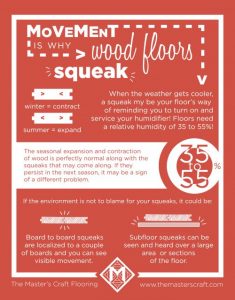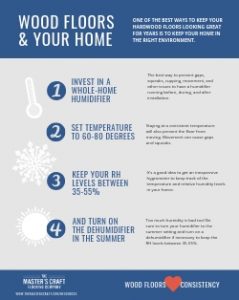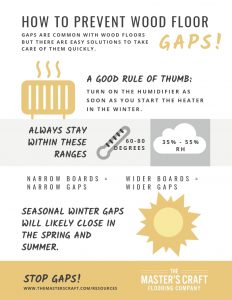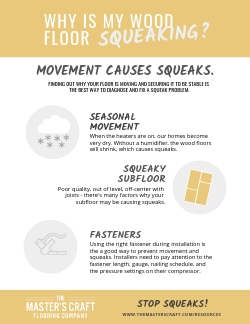It’s the moment we’ve been waiting for since that first triple digit day – fall! That glorious time when there’s a nip in the air, we pull out the jackets, keep the coffee pot running, and use inordinate amounts of nutmeg and cloves in our treats. And sometimes begin to hear a squeaky wood floor in our homes.
As temperatures start to cool, the levels of humidity in the outside and inside environments are also shifting from balmy to dry.
As soon as you turn your heater on, you’re removing even more of that precious moisture from the air. If it is not replaced, your floors will start to tell you about it in a very audible fashion.
So grab your pumpkin spice latte and let’s find out what your floors are telling you when they start squeaking.
Squeaky Wood Floor Cause #1: Something is Moving
The easiest fix for a squeaky wood floor is to stop walking on it. That isn’t realistic but it indicates the root problem with this issue is there is movement somewhere. Once you figure out where the movement is and is coming from, you will be able to quiet down your floors again. Find out why your floor is moving in this article.
DOWNLOAD
#2: I need some attention
Squeaks and creaks are a normal part of having hardwood flooring. But when you notice that squeaky wood floor, take a few moments to listen to what your floor is saying.
Start out by checking your RH levels. Gaps are also a symptom of decreased RH levels. If the problem persists for more than a season, figure out what type of movement is going on.
There are some easy fixes depending on what you’re dealing with, and if ever you need a second opinion with what your floor is trying to tell you, stop by one of our shops and we’ll be happy to help.
#3: The weather has changed and I’m not comfortable
If you are noticing squeaky wood floors during the extreme points in summer or winter, then the movement is related to the environment. In the peak of winter, floors will naturally be drier – your home can be drier than the Sahara at times.
And dry air = shrinking and gaps.

Once the weather shifts, it will go away. The inverse is true for summer when wood swells. To keep this from being problematic, you should have a humidifier to add moisture back into the air and maintain the 35-55% RH that your floor needs to be happy.
So a squeaky wood floor is a good reminder to turn on your humidifier and do any necessary maintenance to the unit. Don’t have a humidifier? Learn more about humidifiers here.
#4: Board to Board Squeaks
This happens when two boards are rubbing where they meet. This type of squeak is localized to one area or to only two boards. You will also be able to see movement with this type of squeak.
#5: Subfloor is Squeaky
If you can take a step away from one squeaky area to another, your problem may be with the subfloor. These squeaks will cover a larger area than just two boards and if you were to see movement, it will be through a larger section of the floor.
There is something not right
If you have a squeaky wood floor that is going on past a seasonal change, then it may be time to look into what else can be going on and call a professional. There are two different areas where these squeaks originate.
We would be happy to answer any questions you have about your floor as well. Find the nearest Master’s Craft location here.
Please fix my squeaky wood floor!
If your squeaky wood floor is driving you crazy, you may be able to fix them with these solutions:
-
- Screws from underneath to seat the flooring to the subfloor in problem areas.
- Hollow spot repair: drilling a hole in the flooring and filling the void with epoxy is a possible solution: http://www.dritac.com/productsRS.php
- Squeak No More: http://www.oberry-enterprises.com this method will allow for top screwing boards, but counter sinking the screws.
- Squeak Ender: http://www.squeakender.com this cures the issue of voids between subfloor and flooring joists. (Shimming the voids can also help here, but might cause squeaks in other areas)
- Lubricants: This may sound a little hokey, but talcum powder, graphite, and WD-40 are all solutions that have helped squeaking floors. This is usually somewhat temporary. One NWFA certified inspector swears by WD-40 as a solution. In these cases, the movement is causing friction between the flooring boards. When this is the case, lubricating the friction points will eliminate the sound.
Need more help? Check out the videos below to learn how to silence your squeaky wood floor.
The Best Way to Stop Squeaks…
Prevent them before they start. We highly recommend using a glue assist method with any nail-down application for floors that are thin, wide, or being installed in an environment with swings and moisture.
Get all the details and learn 2 glue assist methods in our video below:




Hello Caleb, we have a ’95 manufactured house set on a foundation. Several years ago we had a rat problem. It got up under the heavy plastic covering (somehow), that holds up the insulation under the house. At night while all of us were “trying to sleep it would chew the foundation boards to the subfloor. Very loudly! We would use a bat & bang on the floor until it would stop but eventually that did not work any more! Eventually the rat left. (I so badly wanted to call the zoo & ask to borrow a python & let it loose under the the house plastic & catch that rat!!) Now we have very Loud squeaky areas under the subfloor. how do we fix it, not knowing how bad the damage from chewing has caused?
Hi David & Melody…this seems like a nightmare! I’m glad the rat has found somewhere else to live. It sounds like you likely have sections of your subfloor that are warped or not level. This would probably require a professional to evaluate your crawlspace and it’s likely that you would need to remove your flooring, fix the subfloor, and then install new flooring. Best wishes, and hopefully no more rodents in your future!
Our home is 6 years old and we have several areas in our house where the floor squeaks (primary bedroom/closet- carpeted, primary bath- tile, hallways- hardwood).
Should I contact someone to look at foundation?
Hi Christopher, there are a lot of possibilities that may behind your squeak problem. Foundation issues may be one of them, especially if you’ve noticed the squeaks changing or starting recently, or other changes in your home like doors not closing properly, cracks in your drywall, etc. You can see many possible fixes for floor squeaks at this article here: https://floorfixes.com/how-to-fix-squeaky-floors/
Can’t rent my 3nd floor apartment floors crack really bad tile kitchen hardwood everywhere I do have a water problem outside yard
Hi, I just bought a house. It is only five years old and the ceiling sounds a lot, I feel every step as if it was going to fall and it seems that everything is moving. Is there any solution for this? Thank you for you help!
Hi Marie, I’m sorry you seem to be having trouble with your new home. This definitely sounds like a structural issue and you should have a professional flooring installer or home inspector come look at your home to tell you what is going on. All the best!
Hi there! We have newly refinished oak 2 1/4 inch floors in our 1955 home. When the baseboard heat comes on (hot water through pipes), there is a certain section of maybe two boards that snap really loud, in one of our bedrooms. We would prefer to not have to fix from the top, unless it is in the seams or can be done with nail gun and not ruin the poly finish. Any advice? Thank you very much!! Suzy
Hi Suzy! It seems that you have an issue related to your heater that could be causing the boards around it to dry out and possibly shrink or warp. This could be causing the fasteners in your floor to come loose which creates the popping sound when you step near them. If this is indeed the issue, you could top nail the boards with a nail gun, or the better option would be to use special breakaway screws that tighten the floor boards to your subfloor to eliminate the movement that is causing squeaks. You can read about this method here: https://floorfixes.com/how-to-fix-squeaky-floors/#ch3 You can always tough up the small hole that will be created with something called Color Putty that you can match to your floors color.
I have bought a brand new townhouse 6 months ago and it is squeaking on the 2 floor already.
The builder said there’s nothing that can be done.
What can I do about this?
Are there professionals that can fix this?
Sorry you are having problems with your new floor! Squeaks can be really annoying, especially when it’s a brand new house. There are a lot of factors that could determine your best course of action. Squeaks are always the result of movement somewhere. The key is determining where the movement (and squeak) is coming from. Is it in isolated areas? Are boards rubbing together? Or, perhaps the problem is with the subfloor. A professional wood floor company can often help determine what is causing the squeaking. There are also professional flooring inspectors that can give you a full report on why your floor is squeaking. Visit the National Wood Flooring Association (www.nwfa.org) to find professional installers or inspectors in your area. I’ve also written a comprehensive article on how to fix squeaky floors which may help you determine what kind of noise issue you are dealing with. You can find it here: https://floorfixes.com/how-to-fix-squeaky-floors/
Hello,
My home is about 5 years old and I’ve noticed several squeaks throughout the carpeted and hardwood flooring. I have been able to fix almost all of them with the Sqeak No More system when working from above and using glue blocks when I can from underneath. However I have 2 spots that I just can’t seem to fix and it’s driving me nuts (I think I’m mostly annoyed that I’ve invested so much time in this endeavor and there’s still two spots that I can’t seem to get!). These two areas are on carpeted flooring on the 2nd floor (so no option to access from below) and seem to be between the joists. I suspect that the subfloor boards are rubbing together rather than the subfloor being separated from the joist. What do you suggest is the best solution? Thank you!
Hi Kara, I know what you mean about a squeaky floor driving you crazy. Good for you fixing so many of them! Did you know the Squeak No More also comes in a kit for carpeted floors? This kit comes with a couple “joist finding screws” that help you locate where your joists are, and then use the breakaway screws to tighten the subfloor to the joists. You can read about it in another article I wrote here: https://floorfixes.com/how-to-fix-squeaky-floors/#ch5 Good luck!
We bought our house 2 months ago…It looks like the whole house had carpeting for years and was taken out to sell the house( it shows better with hardwoods )…I’m noticing squeaks on both sides of the floor where the beam is below in the basement…It seem to squeak only on that part of the house..Not sure how to explain it but should I put some shims in any areas that have space going along the support beam in my basement??? Or should I put a long 2×4 with glue then nails up against the beam so the flooring won’t move when walking on it…It’s driving me crazy
Hi Cat. Squeaks can be frustrating for sure! Both of those methods could help solve your problem. The 2×4 with adhesive may be your best fix as sometimes shimming can take a lot of trial and error to get right. I have a helpful resource on all the best DIY ways to fix squeaky floors here: https://floorfixes.com/how-to-fix-squeaky-floors/
Hi, I have a 1909 home with terrible squeaks all over the main floor (1200 sq ft). Before we finished the basement we tried to resolve the worst squeaks with shims. It may have solved some squeaks but not all – I suspect some issues are above the ducting and we didn’t get into those areas. The noise is driving me crazy! It is end of summer and I live in Portland Oregon so wondering if it’s especially bad now due to dry weather – even though it’s always pretty bad even in our wet winters… I have done the talcum powder solution it is messy and temporary. It’s a lot of areas to try to solve. The floors are on their last refinish – last owners DIY’d and overdid it. I love the old fir floors though and don’t see a reason to replace them any time soon. I’ve lived with the squeaks for 17 years so far… A few questions – is there a lubricant that lasts the longest – talc, wd-40, lead powder, silicon powder…something else? I’m thinking I need a professional to do a combination of syringe glue, squeeek no more screws, and anything else they can come up with. If only it was one squeak… I’d love to know your thoughts on the longevity of the powder lubricants and so forth…
Isa,
These are great questions, and it seems like you are on the right path. The tricks such as WD-40, talc powder, etc., are really only good for one or two boards that squeak, and they are temporary measures that will have to be reapplied eventually. Squeak No More screws, and glue injections are probably your best long term fix if you don’t want to replace you floors. There are a lot of great things about owning an old home, right? Wood floor queaks, maybe not so much. Good luck!
Please help! A contractor installed a new door between our kitchen (porcelain tile and no squeaks for over 15 years) and our dining room (hardwood oak floor with no squeaks in over 15 years). The contractor removed the transition wood threshold while installing door and replaced it. Now that we are in the cold months in Ohio, there is dramatic squeaking on both sides of transition. I am dealing with breast cancer recovery and this is very upsetting to me as I fear both floors are being ruined and the porcelain tile may crack. Could this be due to improper installation of the transition. I cannot imagine that I can get a floor installer to look at such a seemingly minor issue (for the installer). I do not know what the cause is or how to proceed. I am using a humidifier in the kitchen to no avail. I would appreciate any help.
Hi Mary, I’m sorry you are having to deal with house issues on top of cancer recovery! It is certainly likely that the new door installation caused some change to how tight or secure your flooring is and if there is even a slight amount of movement, that could be the cause of your squeaks. I’m afraid I can’t say exactly what needs to be done here, but I do think it’s worth asking your contractor to come back and take a look to see if there is anything that they may have done to create the movement/squeaking. Best wishes to you, and I hope you get a full recovery quickly!
Hi Caleb. I have some squeaks in my floor that I have narrowed down to exposed nails coming through the plywood sub floor from the basement, which is not finished. Nails rub on plywood when walking on floor and cause the squeak. Before I attempt to try anything I thought I would see what you suggested.
Hi William, it sounds like you are on the right track. It’s nice to be able to see from below where the squeaks are happening. I have a full article written on how to fix squeaky floors from below (and from above) that you can read here: https://floorfixes.com/how-to-fix-squeaky-floors/
I just had 2000 square feet of #1 white oak installed 4″ wide, unfinished. It creaks and groans on every square foot throughout. there is not a spot in the total laid floors that you walk on that doesn’t creak. My instaLLER is telling me they will “quiet down”. Is that correct?
Hi Jonathan – do you remember if your floor prior to this one squeaked as well? A new floor won’t necessarily make an old squeak problem go away. If your subfloor material or the joists holding it up are warped, bowed, or weak then a new wood floor won’t always fix it. This can also happen when going from carpet to wood flooring. Carpet can follow the contours of a warped subfloor and won’t really cause any new squeaks. But when a rigid wood floor is installed over a poor subfloor squeaks are often a common result. Movement causes squeaks, and in general this isn’t likely to go away over time.
i’ve tried all the tactics found here. no luck. i’ve resecured the boards to the joists and the squeak persists. the noise appears to come right under a wall that seperates the hallway and closet on the other side, which i’ve also resecured with Squeak No More screws. no access below floor as it is second floor. any ideas of how to address this problem?
Hi Phong,
That sounds like a frustrating problem! It seems like there may be a bigger void underneath your floor that is causing movement and the screws aren’t able to hold the boards down enough to eliminate the movement and the squeak. There is a product called Dri Tac Solid Wood Repair Kit (they also have one for engineered) that may help. It would inject adhesive underneath your floor to fill in any open areas that might be causing squeaks. It’s not a cheap fix, but perhaps something to consider. It also might be worth having a professional come out to take a look. Good luck!
I am having the same problem. 7 yr old home the floor has started to separate from the wall. The floor joist and wall base wre nailed and the joist meet the center line of the house main beam 4 feet into the Master bedroom. I can slide a putty knife under the wall and feel the nails. I drove some small wedges into the gap injected sub floor adhesive and then pulled the wedges, that decreased most of the problem but the nails are still loos in the was, I plan on next pulling the molding up and using screws at an angle low on the wall thru the base plate and into the joist to pull the two back together. that should stop the floor from moving and the noise. I am open fro any other hints. good luck
most of the carpeted floors in my 18 year manufactured home squeak badly from one end of the house to the other with the exception of 2 interior halls and i bathroom. underneath not accessible without removing all the insulation and cover any my husband refused to do that
Hi Sue! Many people have homes where they cannot access their floors from below to fix parts of the subfloor that are moving and causing squeaks. I would recommend trying the Squeak No More kit that we talk about in this article (see above). There is a break-away screw kit for carpeted floors that can help secure your subfloor to the joists and help reduce the squeaks. Hope this helps!
i mover maybe a.. 200 pound desk into my upstairs bedroom froom my sister larger upstairs bedroom, the floor is not squeaking but i just want to mae sure the desk isn going to fall through my floor lol
We moved a large heavy antique armoire upstairs to my bedroom with carpet over a composite subfloor. The floor squeaked some before, but now the squeak has spread to a much larger area/s. I really want this armoire there but I don’t want to damage our home.
Matthew, it’s likely that this heavy piece of furniture is causing some of the joists or other components of the subfloor to bend, deflect, or warp in some way. Even a slight bow or bend in your joists may create space or other voids in-between your floor and subfloor. These voids will then create squeaks when the floor is walked on. You may try to put a wide, flat board (plywood or other flat piece) underneath your armoire in order to spread the weight of the armoire out over more joists underneath the floor. If you can spread out the weight of the piece it may help eliminate some of the squeaks you are hearing. Ultimately, your floor may not be strong enough to handle this furniture piece without warping your subfloor. Please use caution, and consider getting a professional to evaluate the load bearing capacity of this area of your home and ensure that the room beneath this level in your home is not occupied by anyone if you are at all concerned that the floor is not strong enough to hold this much weight. Thanks for the question!
Definitely what my concern is can the actual structure support it. Dispersing the weight was something that I thought about too. I’ll work on that this weekend. May just decide to give the furniture piece up I’d rather be safe.
Our floors had carpeting and in different areas laminated flooring. The floors squeak all the time, all over…there are some spots that don’t squeak but each greater area has many squeaking parts. We are pulling up all our carpeting and the laminate and putting in engineered hardwood floors. We have already started pulling up the carpet. It seems like now is the time to fix these squeaking problems ( while the plywood is exposed), but we are not sure how to go about doing that or who to call to assess what is really needed. It seems like the suggestions about the plywood and subflooring not being attached properly may fit our situation as it squeaks no matter what season it is and it still squeaks when we are walking on just the plywood. Do you have any suggestions for us?
Dori
Hi Dori! I think you are on track here. If your plywood subfloors are squeaking, it is likely due to the way the plywood is fastened to the joists beneath your floor. If you have a crawlspace or basement with exposed ceilings, you can have one person look at the floor from below while someone else walks around on top. You will likely hear squeaks, and see some movement. Remember: movement is what causes squeaks. If you can identify what parts of your floor are moving (either the joists, or the plywood panels themselves), you can then have a better idea of what needs to be tightened up to stop the movement and stop the squeaks. Good luck!
The four year old tile floor in our bathroom started squeaking during winter (after four years) and stopped squeaking in summer. One tile has a hairline crack now. Is this from humidity ? . The grout in an a-joining bathroom cracked also after squeaking in winter. It was about three years old.
After dealing with breast cancer and an auto accident, I am heartbroken with this issue.
Mary, I understand that flooring problems can be really frustrating, especially when dealing with big life issues like you have experienced. Relative humidity could certainly be a factor in causing cracks to appear in your tile. When homes dry out in the winter, and then expand in the summer it can create movement in subfloors and walls. Tile and grout is especially prone to cracking when there is movement in the subfloor or walls. You may want to get a small device called a hygrometer (usually around $15) that will measure the relative humidity in your home. It is best for most floors to keep your home consistent between 35-55% relative humidity. Best wishes to you!
I think you pin pointed the issue. Do I place the humidifier in the basement under the bathrooms or in the bathrooms ? The ceiling under one bathroom is finished. The ceiling under the second one is not finished. Thanks so much !
A humidifier in the room that is experiencing issues cannot hurt, however, it may be best to consider having a whole home humidifier installed as it will more evenly condition the air throughout your home. A single room unit may not be able to keep all the air in your home at the recommended range of 35-55%. If the ceiling is finished underneath your room, it will likely not help to have one in the basement. However, if you have exposed ceilings in the basement it may be better to put a humidifier there to keep the subfloor from being exposed to extremely dry air. Good luck!
What if the squeaks were occurring after the contractor intervened and removed the old flooring? Some worker fell through for ceiling near the area where there is a large squeak that we didn’t have before the flood. We kept telling them to fix it and asking what the cause was but they kept saying I can’t hear it, it’s normal and resonator, and so forth. But I’m thinking maybe the person hit a support beam when he fellc(supervisor, first day) Insurance never came to inspect it and contractors worked faster than ever had for tbeir overall work period. But the issue was the subfloor or under the subfloor which is causing some issue and is very disruptive and annoying. And is an indicator of their work performance right? Did I mess up not inspecting rhe new damage in more depth and detail? And they laid the floor on without pause to address the issue which didn’t exist before renovation but does cause harder case to fix. Just messed up situation overall and can’t find proof I need to hold them accountable. Any info is appreciated. Thanks.
Wow, Shane! I hope that person is ok. It sounds like there is definitely some structural issues going on and that could definitely lead to squeaks that don’t have anything to do with the subfloor directly. If your joists or beams are not sound, or somehow warped or unstable this could definitely be part of the reason your floors are squeaking. You may need a professional home inspector or flooring inspector to help you sort this one out.
We are looking at buying a house built 22 years ago that has creaky hardwood in the hall. The floor looks looks great. Will we need to tear it up and replace? The hall leads into the kitchen which is Lino and this creaks badly, could the cause be the subfloor?
Hi Nicola, it is likely that the subfloor is the issue. There are a number of ways to tighten your subfloor and eliminate movement, which causes squeaks. It would be best to have a flooring professional give you a consultation to make sure you identify the source of the squeaks.
We bought a house built in the 1950’s and t has hardwoods throughout. All the floors make noise! Not really a squeak, more like a crack. Almost every step sounds like a gunshot, but not as loud of course, but not squeaky. Any thoughts?
Hi Joanne,
Movement is always what causes squeaks. It may be that the fasteners (nails) that hold your floor down have come loose and whenever you are stepping on the floor it is causing the loud noise you are hearing. You may want to have a flooring professional look at your floor, and figure out ways to tighten the floor. This could be done with screws from below the floor (if you have a basement). Hope this helps!
I’m very nervous on the entire top floor of my house. I can feel my husband when he walks on the floor in my bedroom while laying in bed. Is it possible to fall through a squeaky floor?
Hi Candace, I doubt anyone could fall through a squeaky floor. But, if it’s really bad you should probably get it checked out by a flooring professional. Good luck!